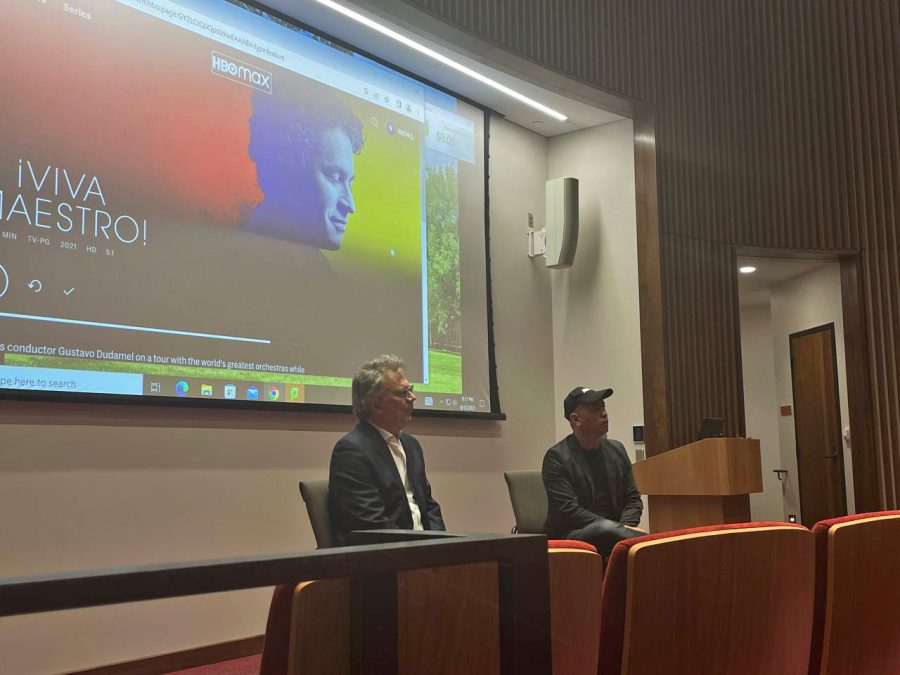“¡Viva Maestro!” explores art, political unrest
Ted Braun (L) and Assistant Professor of Film and Media Studies Nich Perez (R) discuss Braun’s film.
April 17, 2023
“¡Viva Maestro!” is a 2022 feature documentary film that brings the viewer to concert halls around the world as director, writer and producer Ted Braun showcases the electric conductor Gustavo Dudamel. Braun came to Grinnell College last Wednesday, April 12 to screen the movie and participate in a Q&A, sponsored by the Rosenfield Program, the film and media studies concentration and the music department.what
“I think first and foremost, his [Dudamel’s] story is an exemplary tale of the resilience of a person who believes, against incredible obstacles, that art can bring us together in the most trying of times and remind us of why we belong together and what we share in the most principal way as human beings,” said Braun.
Dudamel is currently the music director of the Los Angeles Philharmonic, the Paris Opera and the Simón Bolívar Symphony Orchestra of Venezuela, which is Dudamel’s home country.
The filmmaker described Dudamel as “the most dynamic and important conductor of his generation,” and as “someone who had a unique capacity to bring people from many different walks of life, sociologically.”
Braun said that this documentary was motivated in part by his desire to take a break from making films about big global problems. His two past feature documentaries include “Betting on Zero,” released in 2016 and about economic crime with the company Herbalife, and “Darfur Now,” released in 2007 and about genocide in Darfur, Sedan. Instead, in “¡Viva Maestro!,” Braun places his focus “on someone who was really interested in bringing beauty into the world.”
The Dudamel film is an example of the documentary filmmaking style known as “cinéma vérité,” or observational cinema. Braun described it as “following the unfolding events in a person’s life.” In this style, as the film’s team accompanies the main subject in their daily life, situations change and alter the filming process.
“More often than not, what you expect to unfold turns out to be quite different from what actually unfolds,” said Braun. “You start to engage in a process of constant revision and constant clarification.”
Within the context of “¡Viva Maestro!,” Braun said that they set out to focus on the musical life of the conductor and the drama of the art world, with his home country of Venezuela and its current sociopolitical and economic issues — from hyperinflation to high crime and mortality rates — serving as an expositional backdrop. However, about six weeks into production, Braun said, “the problems of Venezuela exploded and changed the course of his life,” along with the film team’s access to the country and the people they had been filming.
Braun also works as a professor of cinematic arts and Joseph Campbell Endowed Chair of Cinematic Ethics at the University of Southern California. He said he accepted the position of ethics chair because “its place is actually central to everything that we do. That when you put a film out into the world, in some way or another, you’re inviting change,” no matter how great or small. “You’re actually trying in some way or another to suggest people live a little bit differently from the way they did before they came in,” he said, which engages in the realm of human ethics.
To aspiring filmmakers at Grinnell College, Braun said, “The individual, unique signature that you have as a human being has a place in the world, and if you develop your capacities as a filmmaker, which requires enormous discipline, tremendous hard work and a great deal of humility and curiosity about the world, if you develop those capacities, you can bring that individual signature into the world and change it.”



















































